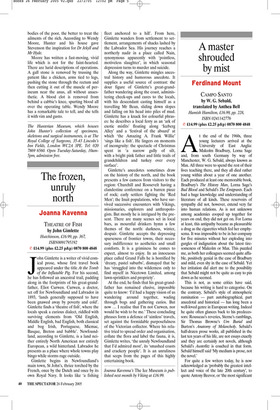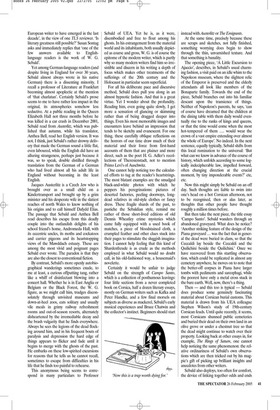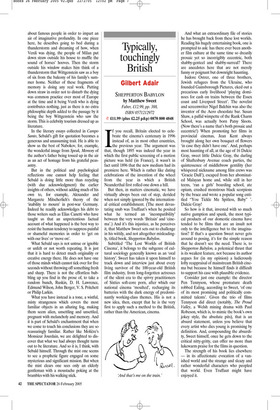A master shrouded by mist
Ferdinand Mount
CAMPO SANTO by W. G. Sebald, translated by Anthea Bell Hamish Hamilton, £16.99, pp. 228, ISBN 0241142776 ✆ £14.99 (plus £2.25 p&p) 0870 800 4848 At the end of the 1960s, three young lecturers arrived at the University of East Anglia: Malcolm Bradbury, Lorna Sage and, from south Germany by way of Manchester, W. G. Sebald, always known as Max. All three were to spend the rest of their lives teaching there, and they all died rather young within about a year of one another. Each produced at least one memorable book, Bradbury’s The History Man, Lorna Sage’s Bad Blood and Sebald’s The Emigrants. Each had a huge knowledge and understanding of literature of all kinds. These reservoirs of sympathy did not, however, extend very far into human relations. As is not unknown among academics cooped up together for years on end, they did not get on. For Lorna at least, this antipathy became as pleasurable a drug as the cigarettes which fed her emphysema. It was impossible to be in her company for five minutes without her exploding into gurgles of indignation about the latest tiresomeness of Malcolm or Max. This puzzled me, as both her colleagues seemed quite affable, positively genial in the case of Bradbury and mild, even shy in the case of Sebald. Yet her irritation did alert me to the possibility that Sebald might not be quite as easy to pin down as he seemed.
This is not, as some critics have said, because his writing is hard to categorise. On the contrary, Sebald’s style of atmospheric rumination — part autobiographical, part anecdotal and historical — has long been a well-loved genre in European writing. Indeed he quite often glances back to his predecessors: Rousseau’s reveries, Sterne’s ramblings, Sir Thomas Browne’s Urn Burial and Burton’s Anatomy of Melancholy. Sebald’s half-dozen prose works, all published in the last ten years of his life, are not essays exactly and they are certainly not novels, although Sebald’s Austerlitz is couched in that form. Sebald himself said ‘My medium is prose, not the novel.’ For quite a few writers today, he is now acknowledged as ‘probably the greatest intellect and voice of the late 20th century’, to quote Antony Beevor, or ‘the most significant European writer to have emerged in the last decade’, in the view of one TLS reviewer. ‘Is literary greatness still possible?’ Susan Sontag asks and immediately replies that ‘one of the few answers available to Englishlanguage readers is the work of W. G. Sebald’.
Yet among German-language readers (and despite living in England for over 30 years, Sebald almost always wrote in his native German) there is a dissenting minority. I recall a professor of Literature at Frankfurt becoming almost apoplectic at the mention of ‘that charlatan’. Certainly Sebald’s prose seems to me to have rather less impact in the original, its atmospherics somehow less seductive. At a public reading in the Queen Elizabeth Hall not three months before he was killed in a car crash in December 2001, Sebald read from Austerlitz, which was published that autumn, while his translator, Anthea Bell, read her English version. It was not, I think, just Sebald’s rather drowsy delivery that made the German sound a little flat, even laboured, while the English did have an alluring strangeness, perhaps just because it was, so to speak, double distilled through translation from the German of a German who had lived almost all his adult life in England without becoming in the least English.
Jacques Austerlitz is a Czech Jew who is brought over as a small child on a Kindertransport and brought up by a grim minister and his desperate wife in the slatiest reaches of north Wales to know nothing of his origins and to call himself Dafydd Elias. The passage that Sebald and Anthea Bell read describes his escape from this deadly couple into the outlandish delights of his school friend’s home, Andromeda Hall, with its eccentric uncles, its moths and cockatoos and carrier pigeons and its heartstopping views of the Mawddach estuary. These are among the most vivid and poignant pages Sebald ever wrote. The paradox is that they are also the closest to conventional fiction.
By contrast, Sebald’s more openly autobiographical wanderings sometimes exude, to me at least, a curious offputting tang, rather like a whiff of disinfectant blowing into a concert hall. Whether he is in East Anglia or Belgium or the Black Forest, the W. G. figure, as we might call him, trudges disconsolately through unvisited museums and down-at-heel zoos, eats solitary and usually vile meals in grimy railway refreshment rooms and out-of-season resorts, alternately disheartened by the irremediable decay and the brash vulgarity that he finds everywhere. Always he sees the legions of the dead flocking around him, and in his frequent bouts of paralysis and depression the hard edge of things appears to flicker and fade until it begins to merge with the ghosts of the past. He embarks on these low-spirited excursions for reasons that he tells us he cannot recall, sometimes to escape from difficulties in his life that he finds too painful to rehearse.
This anonymous being seems to correspond in many particulars to Professor Sebald of UEA. Yet he is, as it were, disembodied and free to float among his ghosts. In his estrangement from the material world and its inhabitants, both usually depicted as coarse and gross, W. G. is of course the epitome of the modern writer, which is partly why so many modern writers find him so irresistible and discern in his writing a depth of focus which makes other treatments of the sufferings of the 20th century and the Holocaust in particular seem superficial.
For all his deliberate pace and discursive method, Sebald does pull you along in an almost hypnotic fashion. And that is a great virtue. Yet I wonder about the profundity. Reading him, even going quite slowly, I get more a sensation of glancing or skimming rather than of being dragged deeper into things. Even his most memorable images and encounters leave behind an impression that tends to be sketchy and evanescent. For one thing, these carefully oblique reflections on the horrors of our time draw much of their material and their force from first-hand accounts of them that are plainer and more direct, such as the poet H. G. Adler’s recollections of Theresienstadt, not to mention Primo Levi’s of Auschwitz.
One cannot help noticing too the calculated efforts to tug at the reader’s heartstrings. The most blatant examples are the smudged black-and-white photos with which he peppers his peregrinations: pictures of deserted factories, peeling doorways, longdead relatives in old-style clothes or fancy dress. These fragile shards of the past, to pastiche the Sebaldian style, remind me rather of those short-lived editions of old Dennis Wheatley crime mysteries which came fully equipped with a used book of matches, a piece of bloodstained cloth, a crumpled feather and other clues stuck into their pages to stimulate the sluggish imagination. I cannot help feeling that this kind of Shardenfreude is as crude as the methods employed in what Sebald would no doubt call, in his old-fashioned way, a housemaid’s novelette.
Certainly it would be unfair to judge Sebald on the strength of Campo Santo, which is a collection of posthumous leavings: four little sections from a never completed book on Corsica, half a dozen literary essays, mostly on German writers such as Kafka and Peter Handke, and a few final morsels on subjects as diverse as mackerel, Sebald’s early musical experiences and Bruce Chatwin and the collector’s instinct. Beginners should start instead with Austerlitz or The Emigrants.
At the same time, precisely because these are scraps and sketches, not fully finished, something worrying does begin to show through the thin, unvarnished texture. And that something is banality.
The opening piece, ‘A Little Excursion to Ajaccio’, describes, in Sebald’s usual charming fashion, a visit paid on an idle whim to the Napoleon museum, where the slightest relic of the Emperor is preserved and the elderly attendants all look like members of the Bonaparte family. Towards the end of the piece, Sebald branches out into his familiar descant upon the transience of things. Neither of Napoleon’s parents, he says, ‘can of course have dreamed that the children at the dining table with them daily would eventually rise to the ranks of kings and queens, or that the time would come when the most hot-tempered of them .... would wear the crown of a vast empire extending over almost the whole of Europe’. No indeed. In the next sentence, equally typically, Sebald shifts from this local rumination to the universal: ‘But what can we know in advance of the course of history, which unfolds according to some logically indecipherable law, impelled forward, often changing direction at the crucial moment, by tiny imponderable events?’ etc, etc.
Now this might simply be Sebald on an off day. Such thoughts are liable to swim into one’s head on a hot Corsican afternoon, not to be recognised, then or alas later, as thoughts that other people have thought roughly a million times before.
But then take the next piece, the title essay ‘Campo Santo’. Sebald wanders through an abandoned graveyard. What does he notice? ‘Another striking feature of the design of the Piana graveyard ... was the fact that in general the dead were buried in clans, so that the Ceccaldi lay beside the Ceccaldi and the Quilichini beside the Quilichini.’ Once we have recovered from this startling observation, which could be replicated in almost any cemetery anywhere, he moves on to note that the better-off corpses in Piana have larger tombs with pediments and sarcophagi, while the poorest have only a metal cross stuck in the bare earth. Well, now, there’s a thing.
Then — and this too is typical — Sebald does produce some genuinely fascinating material about Corsican burial customs. This material is drawn from his UEA colleague Stephen Wilson’s study of 19th-century Corsican feuds. Until quite recently, it seems, most Corsicans shunned public cemeteries and buried their dead on their own land in an olive grove or under a chestnut tree so that the dead might continue to watch over their property. Looking back at other essays in, for example, The Rings of Saturn, one cannot help noticing the same phenomenon: the relative ordinariness of Sebald’s own observations which are then tricked out by his magpie’s gift of picking up brilliant insights and anecdotes from other writers.
Sebald also deploys, too often for comfort, the device of linking together odds and ends about famous people in order to impart an air of imaginative profundity. In one piece here, he describes going to bed during a thunderstorm and dreaming of how, when Verdi was dying, the people of Milan put down straw outside his house to muffle the sound of horses’ hooves. Then the storm outside his window makes him think of a thunderstorm that Wittgenstein saw as a boy of six from the balcony of his family’s summer home. Neither of these fragments of memory is doing any real work. Putting down straw in order not to disturb the dying was common practice over most of Europe at the time and it being Verdi who is dying contributes nothing, just as there is no extra philosophic depth added to the passage by it being the boy Wittgenstein who saw the storm. This is celebrity tourism dressed up as literature.
In the literary essays collected in Campo Santo, Sebald’s gift for quotation becomes a generous and unassuming trait. He is able to show us the best of Nabokov, for, example, the wonderful image from Speak, Memory of the author’s father being tossed up in the air as an act of homage from his grateful peasantry.
But in the political and psychological reflections one cannot help feeling that Sebald is doing little more than recycling (with due acknowledgment) the earlier insights of others, without adding much of his own to, for example, Alexander and Margarete Mitscherlich’s theory of the ‘inability to mourn’ in post-war Germany. Indeed he readily acknowledges his debt to those writers such as Elias Canetti who have taught us that an unpretentious factual account of what happened is the best way to resist the human tendency to suppress painful or shameful memories in order to ‘get on with our lives’ or ‘move on’.
What Sebald says is not untrue or ignoble or unfelt or not worth repeating. It is just that it is hard to detect much originality or creative energy there. He does not have one of those minds which cannot tick over for five seconds without throwing off something fresh and sharp. There is not the effortless bubbling up you find in the prose of, to take a random bunch, Ruskin, D. H. Lawrence, Edmund Wilson, John Berger, V. S. Pritchett or Philip Larkin.
What you have instead is a tone, a wistful, misty strangeness which covers the most familiar objects in an alluring fog, making them seem alien, unsettling and unsettled, pregnant with melancholy and memory. And it is part of Sebald’s enchantment that when we come to touch his conclusions they are so reassuringly familiar. Rather like Molière’s Monsieur Jourdain, we are delighted to discover that what we had always thought turns out to be literature. And so it is, I think, with Sebald himself. Through the mist one seems to see a prophetic figure engaged on some mysterious and significant mission. But when the mist clears one sees only an elderly gentleman with a moustache poking at the brambles with his walking stick.


















































 Previous page
Previous page